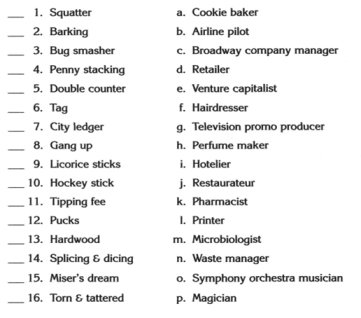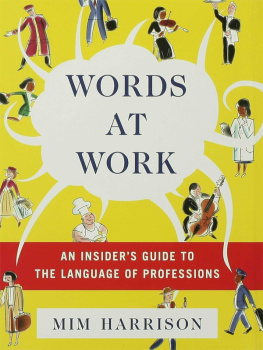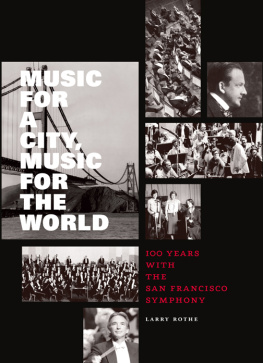WORDS AT
WORK
WORDS AT
WORK
An insider's guide to the language of professions
Mim Harrison
Illustrations by Lee Passarella

Copyright 2006 by Mim Harrison
All rights reserved. No part of this book may be used or reproduced in any manner whatsoever without written permission from the publisher except in the case of brief quotations embodied in critical articles or reviews. For information address Walker & Company, 104 Fifth Avenue, New York, New York 10011.
Published by Walker Publishing Company, Inc., New York
Distributed to the trade by Holtzbrinck Publishers
All papers used by Walker & Company are natural, recyclable products made from wood grown in well-managed forests. The manufacturing processes conform to the environmental regulations of the country of origin.
Library of Congress Cataloging-in-Publication Data has been applied for.
eISBN: 978-0-802-71868-6
Visit Walker & Company's Web site at www.walkerbooks.com
First published with the title Spoken Like a Pro by Levenger Press in 2006
Published in hardcover by Walker & Company in 2007
1 3 5 7 9 10 8 6 4 2
Book design by Danielle Furci
Printed in the United States of America by Quebecor World Taunton
For Mrs. Wehmeyer,
on behalf of all the students
who learned from you
the language of thought and ideas.
And for my father,
who taught me how to be
a true professional.
Contents
"Eighty-six on the fillets"
Restaurateur
Poodles and cannibals
Retailer
Greasers, eepers and glory
Airline Pilot
Weeping marshmallows, Dutching chocolate
Cookie Baker
Gorillacillin
Pharmacist
"EQ the VO with the SFX"
Television Promo Producer
Wooing SMERFs, crunching REVPAR
Hotelier
Hickeys, halos and hot spots
Printer
Blowing for dollars
Symphony Orchestra Musician
Angels, orphans, zombies, vultures
Venture Capitalist
White goods that aren't
Waste Manager
Dummy juice and cereal boxes
Perfume Maker
Spikes, strikes, swings and vamps
Broadway Company Manager
"Do it in the hood"
Microbiologist
"You're the stick in this trick"
Magician

Match the expression at left with the correct profession at right

Answers are in the book.
(If you're really in a hurry, go to the Final Word.)
Samuel Johnson called them cant words and didn't think much of them. The great eighteenth-century lexicographer, who once defined himself as "a writer of dictionaries, a harmless drudge," found words exclusive to a profession to be on a par with "formal affected language" and the kind of talk delivered in "a peculiar and studied tone of voice."
So why devote a book to the prose of the pros? If language is meant to facilitate communication, don't words accessible to only a select few impede it? If only certain engineers know why FONSI doesn't matter, how does that help the rest of us?

Milkshake/frappe/cabinet
But there's another way to look at these terms Fast foods, interstates, chain stores they've conspired to make us all alike. Yet most of us delight in knowing that a New Yorker calls that frothy soda fountain drink a milkshake, a Bostonian knows it as a frappe and a Rhode Islander refers to it as a cabinet. Professionspeak may be one of the few other regionalisms left in America, albeit not one of geography.
There is a special satisfaction in coming upon a term such as tin knocker and knowing that it is the name industrial plumbers assign to the sheet-metal workers installing the ductwork. Or understanding that when a lobbyist says that the legislators are going to take a walk, it means they're leaving the committee room because they've decided not to vote on a particular issue. Or decoding a police officer's reference to felony flyers as high-priced sneakers.
"People love to read about work," observed Stephen King in On Writing. "God knows why, but they do." Perhaps because so many of us have to, or want to, or used to, or hope to work. Listen to the opening lines between two strangers: one of the most frequently asked questions is, "And what do you do?" If we define ourselves in part by what we do, why not define the special vocabularies that help us do it?
Interestingly, even the pros caution that within their fields, the terminology can differ from one place to another, one organization to another. A police dispatch signal in one jurisdiction does not necessarily indicate the same activity in another. One restaurant kitchen may shout "Order up!" to the server while another will announce "The slide is full." (Either way, the food for table seven is ready.) Tip O'Neill's famous maxim about all politics being local holds true for the lexicon of a profession, too.
Conversely, some expressions cross professions. Both a magician and a Broadway actor understand what it means to perform, or act, in one, because they both work from a stage. But who would guess that a venture capitalist and a microbiologist share the term hockey stick, even though each uses it differently?
This chameleon quality of English is among the many traits that make our language so vigorous. "It is the most capacious vital tongue of all," exulted Walt Whitman, "an enormous treasure house...chock full of so many contributions."
No doubt Whitman did not have dribble board, dummyjuice and wand waggerin mind when he wrote that. But the language of work is among those many contributions. Professional shorthand packs an abundance of meaning and information into one crisp, efficient word or phrase.
Perhaps this fascination with working words is part of America's independent streak. As Stacy Schiff tells us in her biography of Benjamin Franklin, the perspicacious patriot advised those Europeans who contemplated moving across the pond after the American Revolution to check their inherited titles at the door. In America, explained Franklin (who had been a printer's apprentice by the age of twelve), "people do not enquire concerning a stranger, what is he? but what can he do?"

Felony flyers
Here, then, are some of the curious, oddball, unexpected and useful words that professionals put to work.
FONSI is an acronym used in engineering for Finding OfNo Significant Impact.

"Food comes first, then morals," pronounces a character in Bertolt Brecht's Threepenny Opera. The connection with theater is apt. "Curtain up" is how one restaurant pro describes the act of opening a restaurant to the public every day. And there is often plenty of high drama between the front of the housethe maitre d', servers, runners and bussersand the back, with both the lowly dishwasher and the lofty chef.
















